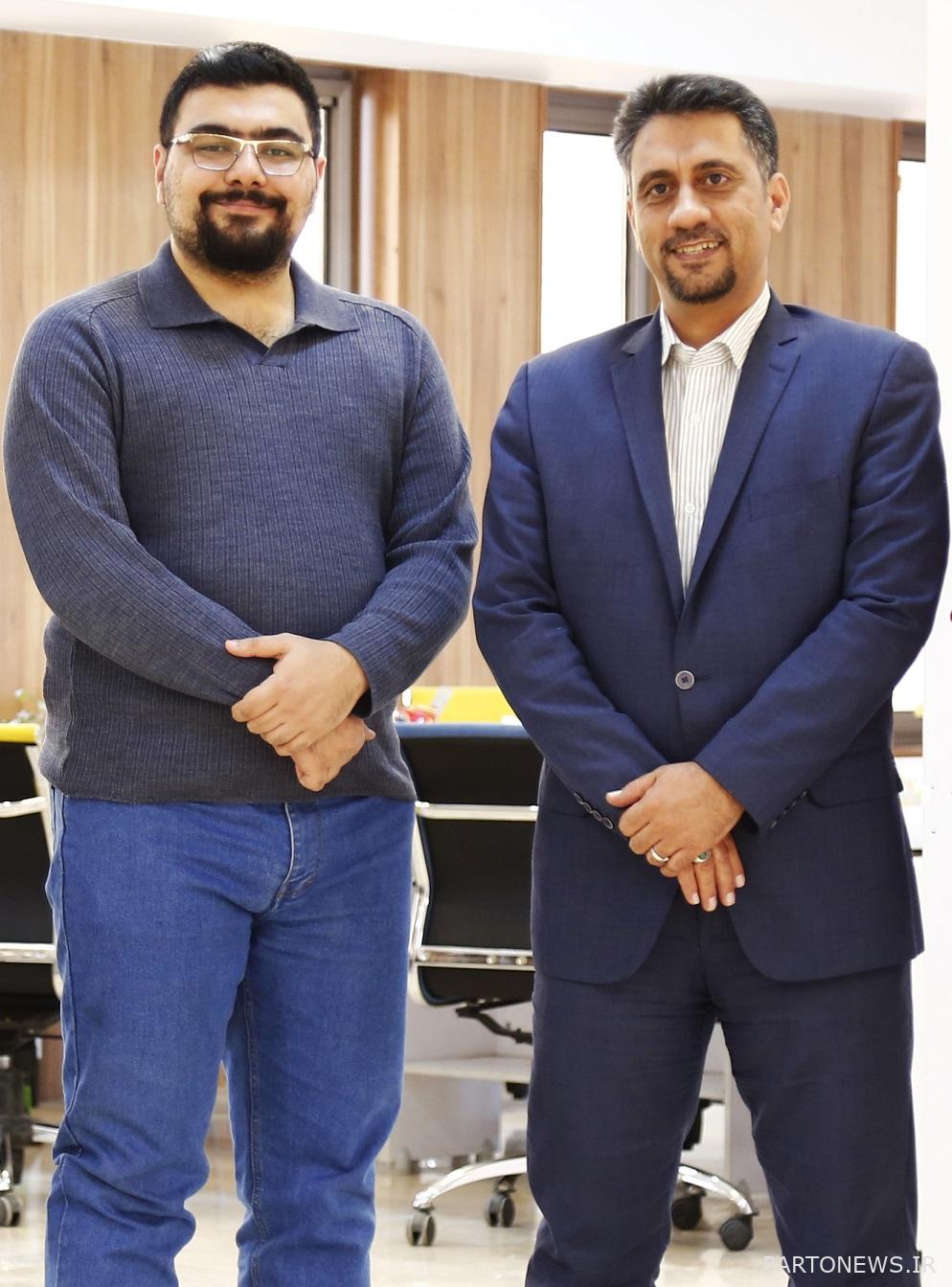Digital health market, eco-motive eco-system virgin spot

In the field of health, in addition to the capital, there have been good activities in the country’s innovation ecosystem in other provinces, and these actions indicate the existence of demand and progress in the field of health in the country.
One of the active cities in this area is Shiraz, where Ecomotive has had a conversation with two key people of the Shiraz hub:
please introduce yourself:
My name is Ali Nik Mohammadi, born in 1356, I graduated with a master’s degree in telecommunications from Amirkabir University and also have an MBA degree from Linköping University in Sweden. For about 20 years, I worked in the field of telecommunications, communication and information technology, and most of these activities were in Iran’s Mobile Communications Company I was active in the technical sector for 10 years and in the business sector for about 8 years, especially in the field of innovation and business development. Then in the innovation ecosystem, your activity in the accelerator Shiraz hub I started
Expert in the field of health acceleration: “I am Amirreza Bahaderpour, born in 1375, I graduated from Isfahan University with a bachelor’s degree in civil engineering. I entered Isfahan’s entrepreneurship ecosystem in 2015 and started doing student work from growth centers, which eventually led to the establishment of Isfahan University’s entrepreneurship center. I am also a member of the Youth Council of the Chamber of Commerce. In the last few years, I launched startups that unfortunately failed. In recent years, I cooperated with Isfahan Accelerators. I was also selected as a member of JCI Isfahan and finally, after finishing my studies in Isfahan, I returned to my hometown of Shiraz and started my activity as a health acceleration expert in Shiraz Hub Accelerator.
What was the purpose of the Shiraz hub?
Nik Mohammadi: The first associate started a start-up organization called the General Administration of Innovation and Business Development, in which the need to establish relationships with universities, youths, and students was recognized as the main source of creativity and innovation. On the other hand, the first companion in its long-term strategy needed a plan beyond its business. In line with the implementation of the “realization of the digital dream” strategy, we created institutions; This ecosystem was formed by the first companion and its senior managers, which included departments such as: accelerator, innovation center and venture capital. Today, this ecosystem has 3 accelerators; 1- Tehran hub with the shareholding of the first partner and Shahid Beheshti University, 2- Isfahan hub with the partnership of Isfahan University of Technology and Isfahan Research Town and the first partner and 3- Shiraz hub with the participation of Shiraz University and the first partner. The main mission of these three CompanyAcceleration of start-up and digital businesses. Another company is active under the name of First Companion Venture Investment, whose shares are 100% owned by First Companion. The main need of this ecosystem is to move towards the digital economy, form businesses in this area and not sell crudely Data Is; Because by starting these businesses, data-based services are formed and the society uses that information.
In other words, it has been tried to make these three hubs work in a specialized manner and divide the tasks among these three hubs; Therefore, in this regard, one of the main priorities of Shiraz Hub is the field of digital health.
What is the abbreviation of Hub Shiraz? What year was it established and what model does it use for acceleration?
Nik Mohammadi: The word hub is an abbreviation of “smart first best”. Hub Shiraz, although it started its activity last year, but it was established in 1996; During this period, we witnessed the presence of accelerators in the field of health, and in a way, during this time, we were pathologizing and analyzing the reason for the lack of success in these accelerators, and in this regard, from the international experiences and communications that I have made in Sweden and abroad. We used the country, and finally, in line with one of the successful accelerators in Sweden called smile, we implemented the NABC operating model, which is very helpful for startups, especially startups in the health sector.
How many teams does Hub Shiraz have in the field of health and at what stage are they each?
Nik Mohammadi: Of course, Hub Shiraz is also active in several other areas such as e-commerce, e-learning, content production, games and media, and Smart City, and it also invests in these types of startups. In our first call, we selected 16 teams out of 74 applicant teams during two stages of evaluation and entered pre-acceleration. 8 teams were in the field of digital health and all 8 teams are currently receiving services; In the “pre-acceleration” period without receiving shares from startups, services such as providing 50 million tomans Grant We present that this financial aid is spent under the supervision of the hub accelerator group, mentors, etc. to improve the product of startups. The teams have a period under the title of course “Boot upThey also receive other services from the Shiraz hub.
What are the conditions for accepting teams?
Bahadurpur: Hub Shiraz offers two types of written and oral evaluation forms to the teams; Through written forms, we get basic data from the team, product conditions, market forecasts, etc. that this form has been uploaded to the site. If they are invited at this stage, the next stage requires the existence of the team and the initial product, as well as the connection of the team area with the work area of the Shiraz hub. Hub Shiraz has 2 calls for team recruitment every year; Because we have 2 specific periods in a year; A “pre-acceleration” period and an “acceleration” period, in which the investment amount reaches 400 million tomans on average, and specialized mentors are referred to the teams. Of course, teams will be given a deadline of 2-3 months to complete the information.
In your opinion, what is the most important challenge of digital health?
Nik Mohammadi: The first challenge in this field is the issue of legislation and regulation and the hard provision of licenses to businesses. another issue Existence and extent Trust is in the community of customers and startups, and how to build audience trust by businesses should be more carefully be compiled On the other hand, the penetration of ict into the field of health and medical society is very slow compared to other fields; Therefore, the trustees of the industry need to think of a solution to solve this problem and raise the level of doctors’ trust in technology. Another challenge is the resistance to the release of information and data, which of course is of great importance in the field of policy making and those in charge of the medical field, and people are worried about the release of their information. Therefore, it is necessary for businesses to pay special attention to these issues and have control over application data.
Does Hub Shiraz have a competitor?
Nik Mohammadi: Of course, at the beginning, I must say that Shiraz is not the only area of our activity and we accept teams from other parts of Iran, especially since we also activated the virtual accelerator platform and many of our activities are virtual. Therefore, we do not have a location limit and our competitors are not limited to Shiraz. Of course, we mostly look at similar collections, through the eyes of colleagues.
Collections such as the growth center of Shiraz University of Medical Sciences; As you know, Shiraz University of Medical Sciences is one of the most prestigious universities in Iran and the Middle East, which is currently a shareholder of one of the Shiraz Hub teams, which is in the pre-acceleration phase. On the other hand, Shiraz University of Medical Sciences and Shiraz Hub are in a way the topic of acceleration in Shiraz city. Hub Shiraz also has memorandums of understanding with universities of the entire province such as Lar University, Fasa University, Shiraz University of Technology, etc./. is to provide additional assistance to startups and other groups with this cooperation.
Have you ever organized educational events?
Bahadurpur: The first event that was the official start of the Shiraz hub accelerator was implemented during the first call of the Shiraz hub complex in November; In the heart of this call, a ten-session training course was held under the title “Boot-up” for accepted teams; In this course, all the basic needs of a startup, from communication with customers, value chain to success factors, etc., were taught.
Apart from this, in Hub Shiraz, we consider it our social responsibility to be active in the field of ecosystem culture; In this regard, we held several public and promotional courses in various fields so that people can get to know more about the concept of ecosystem and startup and the topics of technology and innovation, and we can accept more teams in the call-up courses.
What happens to the teams in the Shiraz Hub after passing through the pre-acceleration and acceleration stages?
Nik Mohammadi: As one of the powerful venture capitalists in this ecosystem, Harkat Ol invested over 200 billion Tomans in start-up businesses last year. 51% of Hub Shiraz’s shares are in the possession of the first movement and the Shiraz hub teams are introduced to the first movement for investment after the pre-acceleration and acceleration periods; In other words, our first priority is to introduce the teams to the first move.
Of course, this does not happen to all teams, and some teams will fall according to the nature of this cycle, and we may even withdraw our shares from the startup and stop cooperating with the startup. does not match the market and conditions and does not have an acceptable performance.
How has corona affected the performance of the Shiraz hub accelerator in the field of health?
Bahadurpur: Apart from the losses it has caused to businesses, Corona has even created opportunities in some sectors. In order to succeed in the Corona situation, in my opinion, the first change should be in the behavior of the medical community and people. During the studies that examined the level of digital maturity of people, we realized that there were changes before and after Corona and we had a good growth in this field. Therefore, this Corona created an opportunity for businesses in the health field to communicate with customers more easily than before. take Also, in the situation of Corona, more investors were attracted in this field and the market opportunities were better identified, so after Corona, a special look has been given to the health sector and many processes such as the provision of licenses were also facilitated these days.
In your opinion, what is the most important reason for the failure of a startup?
Nik Mohammadi: This question is multifaceted; If we consider the circle of failure to be exclusive to the “team”, we have wronged that team; Today, both “failure” and “success” are the result of several parameters, and we must examine the failure of a startup from the international level and analyze the organizations, organizations, and ultimately the startup itself to find the reason.
For example, a startup in a healthy and dynamic economy has a greater chance of success than in an environment with an unhealthy economy! Therefore, some of the failure factors should be analyzed at a higher level, which includes accelerators, collections, and even startups themselves. I believe that even part of the failure of startups in recent years were accelerators, accelerators that did not properly value startups and did not provide their services in appropriate conditions; Therefore, several institutions can be the cause of the failure of a business.
What is the strength of the digital health market in the country?
Nik Mohammadi: The first strength is its “virginity”; Another is the existence of numerous graduates in both the fields of medicine and engineering. These two groups are the main assets of the startup ecosystem and can bring about positive events. The remaining issues are numerous regional and business opportunities that are easily created by these forces.
What advice do you have for people in this field?
Nik Mohammadi: According to my experience in the ecosystem in these years, I think the only key that guarantees success in all areas is “patience”; Businesses should be patient and use the experiences of others and not empty the field and consider that “team building” is not something that happens in a day or even a year. With a little research, we realize that all successful businesses always have a good “team” and a good “team” is formed only with patience and daily studies.
And the final word:
Nik Mohammadi: As we can see, powerful tools like mobile phones have been created and this progress continues, and in the near future, we will witness the growth of technology in the health field by using newer technologies such as 5G, which will have a great impact in the field of digital health. This technology has been launched in Tehran and is a great news that can be given to teams in the field of digital health.
In the future, this technology is capable of providing very good services, and I hope that the teams and loved ones who are active in the field of artificial intelligence will benefit from 5G technology. Unfortunately, we have forgotten that technology should serve businesses, so sometimes businesses instead of focusing on their business model and customers, focus on technology and move away from the essence of the matter; Amirreza Bahaderpour said: Finally, I wish to have more entrepreneurial doctors in the health field, because one of the reasons for the lack of success of health startups is the lack of technical knowledge and The rhythm of changing the medical system is slow.

